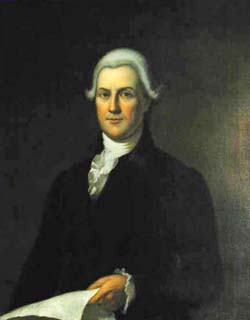Tapping the Scales of Justice - A Dose of Connecticut Legal History

Who was the man that some consider to be the first president of the United States?
Samuel Huntington was born on July 16, 1731 on a farm in Windham, CT. As a young man, Samuel lacked opportunities for formal education, so he instead taught himself in the library of the local minister, Ebenezer Devotion. After years of studying the law books from Devotion's collection, Samuel passed the bar and was admitted to practice law in March of 1754. Samuel married Martha Devotion, the daughter of Ebenezer, in 1761; their union spurred his advance into the upper echelon of the Connecticut colony's legal community. By 1765, Samuel was appointed to the position of King's Attorney for the colony of Connecticut.
Samuel's fervent support of the Patriot cause of independence from British rule inspired him to resign from the position. Moved to help forge a new nation, Samuel was elected and represented Connecticut as a delegate to the Continental Congress. On July 4th, 1776, Samuel Huntington signed the Declaration of Independence, casting his lot with the other fifty-five signers in opposition to the King.
On September 28, 1779, Samuel Huntington was elected 6th president of Congress and began serving his term. During that term, on March 1, 1781, the
Articles of Confederation became operative as the first Constitution of the United States. The first section of the Articles of Confederation contains the first reference to our nation as the 'United States'. Some historians argue that this makes Samuel Huntington the first president of the United States - this point of debate underscores his critical impact on this stage in our nation's founding.
Once his service as the President of the United States Congress concluded, Samuel returned to Connecticut and served in elected positions of state leadership. Between 1784 and 1796, he served as the Lieutenant Governor, Chief Justice of the Connecticut Supreme Court, and, eventually, the state's Governor. During this time, he oversaw the transition of Connecticut into statehood, the adoption of the Federal Constitution, and the beginnings of the building of a State House in the newly made capitol, Hartford.
Samuel Huntington died in his 64th year and was laid to rest in Norwich, CT. Though he rose to exalted positions of leadership, his simple upbringing on a Connecticut farm stayed with him; he was known as a practical man of few words who wrote in a simple style. His quiet leadership and deep commitment to the American Revolution won him the respect of the new nation. Huntington's legacy as a Founding Father and Patriot Connecticut statesman is still felt in the Nutmeg state to this day.
_________________________
Sources of information:
- George Kelsey Dreher, Samuel Huntington, President of Congress Longer Than Expected: A Narrative Essay on the Letters of Samuel Huntington, 1779-1781 (1995)
- John and Katherine Bakeless, Signers of the Declaration (1969)
For more information:
- Huntington Homestead
- Pamphlet "Samuel Huntington" published by Governor Samuel Huntington Trust
- Noreen Gillespie, Washington vs. Huntington, Waterbury Republican, January 27, 2004 p. 3A
- Bill Stanley, The First President of the U.S. Lived in Norwich, And It's Not Who You Think, The Day, January 5, 2003 p. D4
Doses of Connecticut Legal History